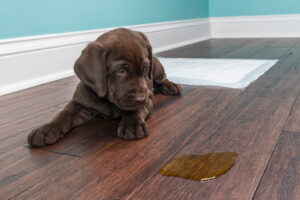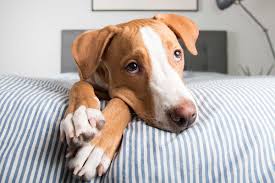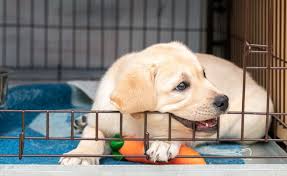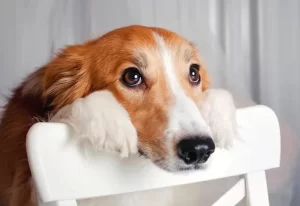
As a puppy parent, you knew housebreaking would be the most challenging part of training your new furry family member. But nothing prepared you for the biggest obstacle of all: a puppy who won’t pee before bed.
During the day, it’s easy to stay on top of your puppy’s potty-training routines, but nighttime is an entirely different story. How can you encourage your fluffy young friend to pee at bedtime? Here are a few reasons your dog won’t pee at night and some training tips to ensure you both get a good night’s sleep.
Reasons Why Your Puppy Won’t Pee Before Bed

There are many reasons your dog won’t go during his last potty break. Here are the most common issues owners face.
The Fun Is Over
Young dogs quickly learn that bedtime means the end of their fun. Their doggie brains tell them not to pee because they don’t want to go to bed yet.
Bringing puppies in immediately after they pee teaches them that the fun stops after they go.
Instead of ending their outdoor session immediately, let them stay outside for a few extra minutes. Doing this means they won’t associate the final potty break with the end of their day.
Don’t let your puppy get too excited with an active play session. Instead, let the dog sniff around and explore for a short time before bringing them in and calling it a night. If you’re walking them, don’t end the walk immediately after they pee. Continue for just a little longer before heading inside.
They Need a Little More Time Outside

If your puppy hasn’t peed within a few minutes of being outside, don’t bring them in. Puppies are easily distracted and haven’t learned to go on command yet. You will need to let them stay outside until they pee and praise them when they finally do.
Only bring them back inside if they’ve been out for more than fifteen minutes and still haven’t peed, but make sure to take them back outside after a half hour.
Dogs are very attuned to their owner’s reactions. Losing your patience will only make matters worse.
It’s Scary Out There!
Dogs are most vulnerable when peeing and pooping. They need to be relaxed and confident in their surroundings.
If puppies are nervous or frightened outside in the dark, they will be reluctant to pee at night. Nighttime sounds and smells can seem very frightening to a young puppy, and it’s even worse if they’ve experienced something scary in the yard.
Ensure your yard is brightly lit with floodlights to reduce your dog’s anxiety. Stay with them if they seem nervous outside in the dark.
Uncooperative Weather

Some puppies won’t go outside if it’s rainy and wet. If your pup is a weather diva, it must be exposed to damp fur and soggy paws to eliminate anxiety.
You can help reduce their dislike of being wet by bathing them, letting them splash in puddles and streams, playing with them using a hose or sprinkler, and placing treats and toys in the damp grass. Keep these experiences positive, and never punish your puppy with a squirt gun.
If your dog refuses to go outside in wet weather, purchase a puppy raincoat and booties. Get them used to wearing these items by putting them on when the weather is nice to make it easier to slip them on when you need them.
Consider grabbing an umbrella and a leash if they don’t want to go outside in the rain. Few dogs can resist a walk even if they don’t want to go in the wet yard.
You Haven’t Established a Routine
Dogs are creatures of habit, and establishing a routine helps them understand expectations.
Choose a time for your puppy’s nightly bedtime potty break and stick with it as closely as possible. Even if your bedtime isn’t consistent, make sure your puppy’s last bathroom break is.
Your Puppy Doesn’t Need to Go

A puppy who hasn’t had anything to eat or drink since the last time they were out may not physically need to potty. If this seems to be the issue, shorten the time between taking their water away for the night and the last potty break. Take them for a walk to encourage them to pee if they won’t go in the yard.
Remember, just because they don’t think they need to go doesn’t mean they won’t go if you’ve trained them to pee on command.
Tips to Encourage Your Puppy to Pee at Bedtime

Understanding why your puppy won’t pee at bedtime is the first step to fixing the problem. Here are a few helpful tips to help you and your puppy establish the perfect bedtime potty break routine.
Walk Your Puppy Before Bedtime
Take your puppy on a walk to encourage them to pee. This walk doesn’t just help them to go; it also tires them out so you both get a great night’s sleep. A sleeping puppy holds their pee longer than an awake one, but remember to let them out again around four hours after they go to bed.
Let Your Puppy Sleep for an Hour Before Their Last Potty Break

Puppies pee when they wake up. Let them nap for an hour before you go to bed before waking them and letting them go outside for a final potty break. You don’t want to let them sleep too long, though, or they may not want to go back to sleep when you come inside.
Train Your Puppy to Pee on Command
The golden rule of puppy training is to make the right choice more rewarding than the wrong one. When your puppy pees outside, praise them and reward them with treats and playtime. Give this behavior a simple one-word command.
When your puppy pees, repeat the command enthusiastically, showing that you’re pleased they’re cooperating. You’ll find that they quickly learn to pee on command because they love the rewards that come with it.
Crate Training

Puppies will try to avoid peeing where they sleep, so crate training is an excellent option for overnight housebreaking. Make sure that the crate is the puppy’s safe space by giving them crate-only toys and comfortable bedding, and never punish your puppy by putting them in the crate.
Tips for crate training:
- Take off collars and tags that may get hooked on the bars of the crate.
- Encourage the puppy to use the crate on its own by leaving it open throughout the day.
- Choose a crate with just enough room for the puppy to stand up, lie comfortably, and turn around.
- Make sure the puppy is relaxed before putting them in the crate.
- Create a “crate” command for your puppy.
Dogs can be successfully crate trained because of their instinctive desire to shelter in quiet spots when they want to rest. You’ll be surprised at how often your puppy sleeps in the crate throughout the day.
Frequently Asked Questions

Here are a few common concerns new dog owners have when getting their puppy into the routine of peeing before bedtime.
Sleeping puppies can hold their bladder for up to four hours at night. They will need to be let out immediately upon waking. New owners can decrease their risk of nighttime accidents by setting an alarm to let the puppy out four hours after its bedtime.
In older dogs, not peeing becomes a concern after 24 hours of not peeing. A puppy, however, has no bladder control and will naturally pee far more frequently. A puppy who hasn’t peed in 12 hours may need a quick visit to the vet to ensure all is well.
Remember that very young puppies have no bladder control, so it’s safer to let them out every hour and a half from 8 weeks to 12 weeks of age. After 12 weeks, you can add one hour for every month of age.
Once your puppy learns to control their bladder, you may be surprised at how long they go without urinating. If they are having too much fun playing or the weather is cold or damp, they may hold it for several hours. If your puppy has gone more than 12 hours without peeing, however, you may need to call your vet to rule out a medical issue.
Generally speaking, a dog will not pee around their food, water, or bed. This is why crate training is such a successful method of housebreaking a dog. If your puppy has an accident in the crate, don’t punish them. Let them out as you normally would and replace the soiled bedding with clean bedding.
Conclusion for “Puppy Won’t Pee Before Bed”

Remember that young puppies will have no idea what is expected of them, including what they need to do before going to bed. Patience and consistency will yield rewards, however, and by following these tips, your pup will quickly learn to pee before bedtime every night.
If you find this guide, “Puppy Won’t Pee Before Bed,” helpful, you can check out these other guides from our team at We Love Doodles:
- Dog Ate A Sponge: What Do I Do? (2023)
- My Dog’s Stomach Is Turning Purple. What Do I Do? (2023)
- Regret Getting a Puppy. What Should I Do? (2023)
You can learn more about puppy pee training by watching “7 Quick Tips for TOILET TRAINING a Puppy or Dog” down below:

Dr. Sabrina Kong graduated from the Royal Veterinary College in England in 2016 and has been working at a small animal clinic in Northern California since then. She grew up in the Bay Area and got her bachelor’s degree from Cal Poly San Luis Obispo. She also became a Certified Canine Rehabilitation Practitioner through a program at the University of Tennessee.
When she isn’t in the clinic taking care of her four-legged patients, she enjoys traveling and trying new foods with her friends and her three-legged dog, Apollo. She adopted Apollo from her clinic when he was a puppy with numerous health issues. Dr. Kong truly cares about taking care of animals.